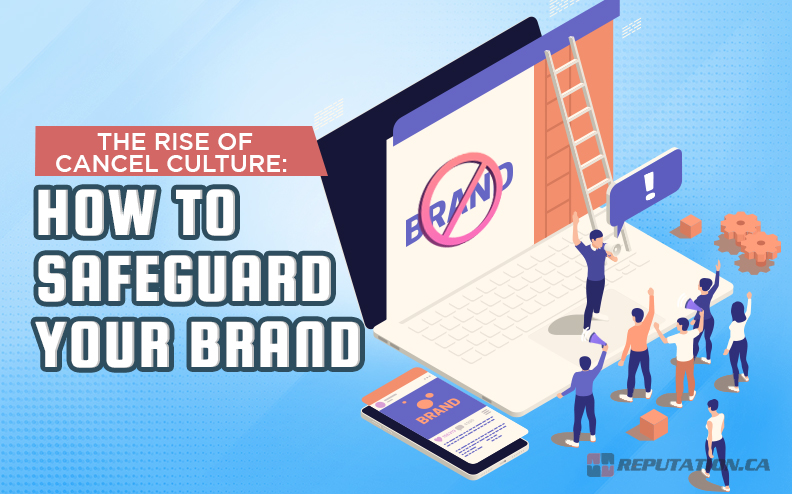Have you ever witnessed a thunderstorm of tweets calling out a brand? The power and the lightning speed with which reputations can be tarnished in this digital age is awe-inspiring. Welcome to the world of cancel culture and reputation management.
Picture this: one misstep, one poorly thought-out social media post can put your brand on the chopping block. It’s like walking on thin ice—each step is carefully calculated yet still prone to cracks.
“How can I protect my brand from potential online storms?” – that’s the question we’re here to answer.
So, stick around! This article is more than just a skim-read. It’s chock-full of actionable strategies, insights into crisis PR plans, and real-life case studies that could help you avoid the pitfalls of cancel culture attacks.
Understanding Cancel Culture and Its Impact on Brands
Recently, “cancel culture” has become a highly debated issue in the social media space. This contemporary phenomenon sees individuals or entities publicly criticized, boycotted, or ostracized due to perceived offensive behavior or statements.
A cancel culture attack can have severe repercussions for brands. It’s not just about reputational damage – it often hits where it hurts most: financial performance. When public opinion turns sour because of something posted online many years ago by an original poster related to your brand, customers might start asking questions about your company’s values.
As crisis PR experts, we suggest that having a robust reputation management strategy in place is crucial during these times, as even minor incidents can snowball at lightning speed into major crises thanks to the ubiquity and immediacy of social media platforms. You’re held accountable for what you’ve said or done in the past like never before – this could be anything from controversial opinions online leading to people canceling their subscriptions en masse.

Social media plays a key role when we talk about cancel culture since it allows negative perceptions and reactions towards any particular incident associated with a brand to spread rapidly across various networks around the world.
This goes beyond being simply another crisis communications issue; its potential impact extends far deeper than traditional scandals, given how quickly information (and misinformation) spreads today via tweets and shares over popular social media platforms such as Twitter, Facebook, etc., sometimes turning relatively unknown issues into headline news overnight. And remember folks: once something’s been shared out there on those networks – it stays forever, regardless of whether someone deletes their account later down the line.
But don’t worry; this link can provide some insights on how to navigate a PR crisis. While you’re at it, make sure to pay attention and test-drive your social media privacy settings as well.
Proactive Measures in Reputation Management
As the digital sphere evolves and news spreads rapidly, brands must be cognizant of how their actions can result in “cancel culture” – a phenomenon that has necessitated proactive reputation management. One wrong move, one ill-advised tweet, or a poorly timed ad can trigger what’s now known as “cancel culture.” As media intelligence data suggests, proactive reputation management has become an essential strategy.
A key component of managing your brand’s reputation involves making full use of media intelligence. It allows you to conduct real-time crisis detection and sentiment analysis with cultural-sensitive research that aids in identifying potential threats early on. By monitoring public sentiment about your brand across various platforms like social media posts and online forums, you are better equipped to respond more quickly when things go south.
This level of vigilance helps identify key influencers and stakeholders who could impact public perception positively or negatively towards your brand. But remember: it’s not just about tracking negative comments but also understanding where they’re coming from.
You might ask why this is necessary. Consider how fast-paced our society has become due to technology advancements such as high-speed internet connections or lightning-fast processors—news travels at lightning speed these days. That’s why taking preventative measures against possible reputational damage should be a top priority if you want to stay ahead instead of reacting after the fact.

Beyond using advanced tools like media intelligence systems, creating a proactive content strategy forms another pillar in guarding against cancel culture attacks. This includes careful planning around sensitive topics while maintaining authenticity so that your audience knows what you stand for without offending anyone unnecessarily.
This report suggests establishing clear guidelines for social media usage, setting up strong social media privacy settings, and being transparent about data usage. If a mistake is made, own it publicly and sincerely.
Let’s be real: there are no foolproof methods to avoid cancel culture completely. But by staying informed of key topics relevant to your brand, monitoring social media conversations closely, and having a crisis PR plan ready to roll out at any given moment – you can safeguard against most threats that come your way.
Crafting an Effective Crisis Management Plan
When a cancel culture attack strikes, it’s like a storm. It hits hard and fast, leaving your brand reputation in need of quick repair. That’s where having a crisis management plan comes into play.
The key to navigating through this tempest lies in strategic communications. Like seasoned sailors using compasses and maps to weather the storm, brands need tools to guide them, too.

To start crafting an effective crisis management plan, you first have to understand what you’re up against – cancel culture. As unpredictable as it can be damaging, PR crises due to “cancel culture” attacks occur with lightning speed.
You’ll need foresight and agility on social media platforms where these storms often brew.
- Identify Potential Threats: Keep track of opinions online about your brand. Use tools that monitor social media posts for red flags-related signals indicating brewing trouble.
- Create Actionable Responses: Every potential PR issue requires different handling techniques; so does each platform.
- Evaluate And Learn: Avoid future threats by learning from past experiences.
No two storms are alike, but preparation helps handle even the worst squalls at sea or “cancel culture” attacks on land. Remember: A well-prepared sailor never fears the sea!
Let’s delve into the potent duo: social listening and transparency. In today’s world, where cancel culture is gaining momentum, brands must be proactive in managing their online reputation. One powerful tool at their disposal? Social listening.
Social listening gives you a chance to tune into ongoing conversations about your brand across various media platforms.
This practice lets you catch red flags before they turn into full-blown crises by monitoring key topics related to your brand or industry on social media posts and other digital spaces.
You can use this insight to get ahead of any potential PR crisis that might put your reputation on the chopping block.
A critical part of effective social listening involves responding fast as soon as issues arise. It shows that you’re paying attention, which builds trust with consumers who expect brands to react at lightning speed these days.
Your ability not just to listen but also to respond appropriately is crucial in maintaining a positive image amid potential cancel culture attacks.

People nowadays are holding corporations responsible for their words and deeds more than ever before. So it’s no surprise that customers value honesty from the companies they interact with; hence comes our second hero – transparency.
This isn’t merely about admitting mistakes when things go wrong (although that certainly helps). It’s about creating a genuine dialogue between business and customer — giving them real insights into company operations or acknowledging public opinion even if it hurts sometimes.
Transparency builds trust, and that’s the cornerstone of a robust brand reputation management strategy. It lets you maintain control over your narrative before others try to shape it for you.
While cancel culture can be brutal, remember this: brands with nothing to hide will have less fear from the “cancel culture” warriors.
If we can learn anything from this, it’s that perseverance and dedication truly pay off. Always keep pushing forward.
Case Studies of Brands Affected by Cancel Culture
The impacts of cancel culture are felt across the board, with some brands facing more severe repercussions than others. Let’s take a deeper dive into two prominent examples.
- The fashion industry has had its fair share of “cancel culture” incidents. One notable case involved Gucci, which found itself in hot water. The luxury brand faced significant backlash after releasing a sweater that was criticized for resembling blackface imagery. This resulted in customer boycotts and serious reputational damage.
- A second instance involves Dove, known for their inclusive marketing campaigns. However, they fell foul to public opinion when a Dove ad showed a Black woman transforming into a White woman after using their product. Seen as racially insensitive, it led to calls for people to “cancel” Dove on various social media platforms.
In both cases, these were major brands with huge followings that suddenly found themselves needing immediate crisis PR management plans to control and mitigate the effects caused by cancel culture attacks online.

These examples illustrate how even big names can face intense scrutiny due to perceived offensive behavior or statements posted online years ago or, indeed, very recently. It shows just how quickly negative perceptions can spread at lightning speed through our connected world today, thanks largely to popular social media posts gaining traction fast on major platforms like Twitter and Facebook, amongst others, causing further potential reputational damage if not addressed promptly and correctly.
Long-Term Strategies for Brand Resilience Against Cancel Culture
A strong resilience strategy is crucial to protect your brand against potential cancel culture attacks. This includes developing an authentic and transparent relationship with your audience, as well as monitoring social media platforms regularly.
The key to building a brand that can withstand the pressures of cancel culture lies in two core strategies: transparency and empathy. According to data, these elements play significant roles in effective brand reputation management. By being open about your actions and showing understanding towards different viewpoints, you create trust between your brand and its audience.
Next up is proactivity. You don’t want to be playing catch-up when something hits; instead, aim to spot red flags early on through active monitoring of online chatter related to your brand.
Avoiding “cancel culture” isn’t just about crisis aversion, though – it’s also an opportunity for positive engagement with customers. If you’re aware of what’s being said about you online, then you have the chance not only to avoid future crises but also to get ahead by responding before anything blows out of proportion.

In this digital age, where opinions are posted online at lightning speed, one important tool in proactive reputation management is media intelligence. It enables real-time detection of negative perceptions, which could lead to a full-blown PR crisis.
Social listening tools let brands identify potential threats or issues before they become major problems. They offer insights into public opinion trends, helping you spot a potential “cancel culture” attack before it’s too late.
Lastly, remember that everyone makes mistakes. It’s how one deals with them that counts. By owning up to errors and demonstrating sincere efforts towards resolution, your brand can turn negative situations into opportunities for growth and learning.
Best Practices in Reputation Management to Safeguard Against Cancel Culture
In the era of cancel culture, reputation management has become crucial for brands. With lightning speed, opinions online can shape public perception and cause reputational damage.
Cancel culture, often facilitated by social media platforms, holds entities accountable for perceived offenses. A misstep on social media could have serious repercussions for your brand’s reputation. But fear not. There are ways to safeguard your online reputation against this modern-day “cancel culture.”
Monitoring social media posts and being aware of what’s being said about your brand is key. Using tools that track mentions across various platforms allows you to identify potential red flags early on before they escalate into a full-blown crisis communications situation.

It’s wise to have a crisis PR plan ready and at hand, even if there’s no immediate threat looming over your head right now. You should be able to respond with agility if ever faced with negative perceptions triggered by an unexpected cancel culture event.
Safeguarding sensitive information from online attackers involves ensuring proper password protection measures as well; think along the lines of using secure password managers such as LastPass or Dashlane. These will help prevent unauthorized access that might lead to unwanted situations where people try canceling your brand due to a mishap.
Avoiding cancel culture is not just about damage control but also about projecting a positive image. Engage with key topics, and make sure you’re consistently contributing value to the conversation. This can help build goodwill that protects against potential backlash.
A tweet from ten years ago or an old blog post could easily resurface and impact your reputation today. It’s crucial to always stay ahead of the game by managing and maintaining a positive online presence.
Take Back Your Reputation!
Let’s be real: cancel culture can strike at lightning speed. But with the right reputation management strategy in place, you’re not defenseless.
You’ve learned how to tap into media intelligence and social listening for early warning signs. You now know that crafting an effective crisis PR plan is your best defense against a cancel culture attack.
Remember those case studies? They taught us lessons on what to do (and what not) when under fire. And they showed us the importance of long-term strategies in building brand resilience.

Cancel culture and reputation management are intertwined in today’s digital world. The trick is to stay proactive, transparent, and ready for potential PR storms ahead.
Reputation is your go-to for managing and guiding online perception for businesses across North America. Our expertise is broad, covering everything from managing reviews to navigating social media, public relations, and even Wikipedia. If your brand faces a unified and high-profile cancel culture attack, we can guide you through controlling this crisis. Have questions? We’re always ready and happy to answer them for you.











